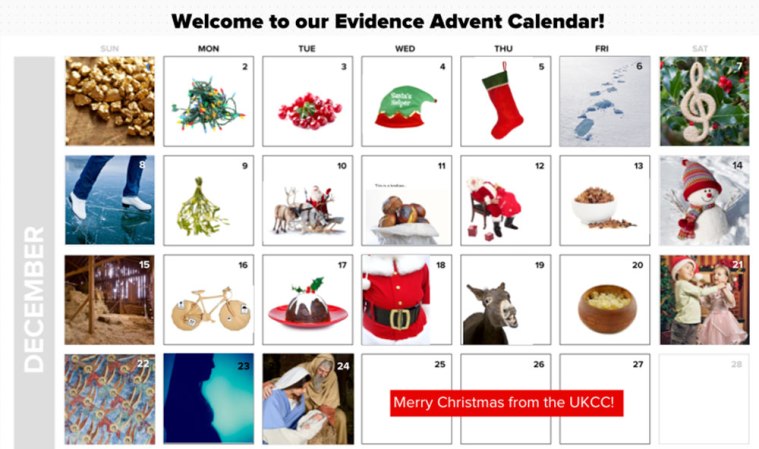Tools to help assess a patient’s risk of developing a pressure ulcer have been in use for half a century, but do they actually result in fewer pressure ulcers, or do they take up nurses’ time which could be better spent with the patient? An updated Cochrane review gives us the current state of the evidence. Continue reading
Tag Archives: Cochrane Wounds Group
Silver, napkins and some choice morsels of Cochrane evidence
Last week I gave you jellyfish, so don’t let it be said that I only go for the big health issues here! There’s a feast of new evidence in The Cochrane Library and this week, from an extensive menu, I’ve picked out a few tidbits on some more common health problems, plus some great dementia resources and a beautiful project that I want to highlight. Continue reading
An evidence advent calendar!
It turns out that Cochrane’s for Christmas, not just for life, with evidence in the Cochrane Library on all manner of festive things from gold, frankincense and myrrh to stockings! Ok, some of the links are a bit tenuous, but we hope you’ll enjoy our advent calendar.
Owing to some trouble with the technology elves, we couldn’t make it interactive (boo!) but each day we’ll post some Cochrane evidence related to the day’s picture, below the calendar. If you think of any others, do share them via the comments box.

Flu, chills and other ills: a wintry round-up of Cochrane evidence
This week it really feels like winter is upon us and infection is the dominant theme in this blog, which gives you a round-up of some new and updated Cochrane reviews on flu vaccination; antibiotics for colds, sore throats and for those having feeding tubes put in; bringing down your poorly child’s temperature and whether avoiding lactose is helpful when diarrhoea strikes. Continue reading
A mystery, missing evidence and some answers!
Contrary to what you might expect, you’ll have to wait until the end for the mystery, though in truth missing data and important questions that remain unanswered could also be labelled as that, and this is where I start.
My last blog was a round-up of new and updated reviews on asthma and I begin this one with another offering from the Cochrane Airways Group (do these people never take a day off?). It’s another tale of what we still don’t know, this time about a class of anti-inflammatory drugs called anti-leukotrines. For managing mild persistent asthma in children, low-dose inhaled corticosteroids (ICS) are recommended, but if symptoms aren’t well controlled with ICS then anti-leukotrines may be added. Almost ten years ago, a Cochrane review was published which pulled together the available evidence on the safety and effectiveness of this treatment for adults and children and found very little to go on, with just two small trials with children. Now a review has been published which looked for trials involving children (any age below 18) and finds we’re not much further on.
Hot off the press: catch this Cochrane evidence!
If your idea of a present is a new or updated Cochrane review then it’s now Christmas every day with the arrival of Publish When Ready here in Cochraneland. In a huge change to the system for publishing reviews and protocols in the Cochrane Library, new arrivals appear daily, throughout the day, instead of once a month. In the time it takes me to make a cup of tea, a new review may have popped into the Library, ready for my consumption. It’s all rather exciting! It’s also rather alarming, as I have the distinct feeling that with such a rapid flow of evidence I may miss things and fail to shout about stuff that you might like to know about. It may calm down (or I may speed up!) but with the sudden arrival of a very large amount of new evidence I thought I’d give you a bit of a round-up. So here are my picks of the week on surgery, drugs and rock’n’roll, with some talking treatment thrown in. Continue reading
Non-removable casts are better than dressings or removable casts for helping diabetes-related foot ulcers heal
Key message: Non-removable, pressure-relieving casts are more effective in healing diabetes-related plantar foot ulcers than removable casts, or dressings alone
Diabetes is a serious chronic disease that’s on the rise, thanks to ever more sedentary lifestyles, changes in our diet and people living longer. Since the mid-1990s, the number of people with diabetes in the UK has risen from 1.4 million to 2.9 million and it’s estimated that 4 million of us will be diabetic by 2025. Continue reading

